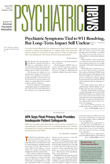The anniversary of 9/11 is a natural time for reflection. At the time of the attack on the World Trade Center, I was writing up the minutes from the fall meeting of the APA Committee on Psychiatric Dimensions of Disasters. Ironically, at that meeting we had requested that the charge of our committee be worded to state explicitly our focus on terrorism as well as natural and technological disasters.
I vividly recall the phone call from a colleague telling me that a plane had hit the World Trade Center and the subsequent confusion and disbelief that followed as the remainder of the day’s events unfolded.
My first e-mail message following the attack came from Art Rousseau, M.D., the president of the Oklahoma district branch at the time of the 1995 bombing of the Alfred P. Murrah Federal Building. In the message, he offered to help in any way he could. Then–APA President Richard Harding, M.D., called shortly afterward to offer the support of the Association and to ask how APA could help.
Over the hours and days that followed, there was a tremendous outpouring of e-mail and phone calls from psychiatrists across the country volunteering their assistance. APA members and staff at the central office and at DBs throughout the country mobilized to respond and to prepare their communities for any further attacks.
APA’s support of disaster psychiatry and the committee’s work over the past years certainly paid off. The disaster Web page on APA’s Web site proved to be an expeditious way to disseminate general disaster psychiatry information, as well as information tailored for the circumstances of September 11. New fact sheets were developed to address a variety of topics such as how to talk with children about the attacks and advice for leaders.
APA awarded Erich Lindemann disaster grants to the five district branches most heavily affected, which they used to develop educational materials and outreach. Committee members worked with the media to educate the public on normal responses to trauma and indications for seeking professional help. Disaster psychiatrists also worked with local, state, and federal government officials to plan mental health intervention strategies.
September 11 highlighted a number of areas that require further work.
Disasters often cross jurisdictional boundaries, but credentialing, licensure, and malpractice coverage remain problematic for psychiatrists who want to volunteer outside their home state. Disaster psychiatry curricula are being developed to better prepare psychiatrists in the community. In some areas, alert rosters of interested and disaster-trained psychiatrists are being compiled that can be activated in time of need.
The tremendous psychological impact of September 11 underscored the importance of surveillance for mental as well as general health in affected populations. Similarly, the need for well-controlled efficacy studies of acute mental health interventions was highlighted. The longer-term mental health effects of September 11 and the anthrax letters remain to be seen. New plans for homeland security must address mental health as well as public health and acute medical care considerations in planning and response.
Efforts are now under way to incorporate “lessons learned” from September 11 and the anthrax attacks to prepare psychiatrists for the challenges we now face. The APA Assembly passed a proposal asking each district branch to designate a member to be a point of contact for disaster response. A distribution list of these contacts has been developed to facilitate communication.
In addition, through a generous grant from the American Psychiatric Foundation, our committee is developing a disaster psychiatry handbook and is enhancing its Web page.
All disasters, whether they are caused by hurricanes or sarin, are local events—at least initially. The first anniversary of 9/11 is a reminder to all of us to ensure that our communities are prepared for whatever disaster might lie ahead. The development of an active, vital disaster committee in each DB is a critical step in this direction. ▪
